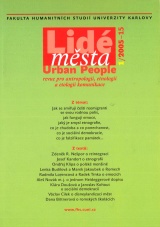Sociální, pracovní a habitační aspekty reintegrace západních emigrantů do české společnosti
DOI:
https://doi.org/10.14712/12128112.3930Abstrakt
The fall of the East block and the socio-economic transformation of the Czech Republic after 1989, alongside globalization, led to a significant increase of international migration between the Czech Republic and other countries. However, so far, the modern interpretative model of such population movements, and especially, the use of economic sociology and social anthropology, has not been applied, not even in the scientific or the public discourse. The negative result of it is a lacking public debate about migration and the lingering of an outmoded assimilation model of the relationship between immigrants and the Czech majority, and a traditionalist view of the structure and function of a national community. An important group of today’s immigrants into the Czech Republic are Czechs living abroad, in the countries of the former East block but mainly those who migrated west during the communist regime (1948-1989). They in particular might become an important intercultural mediator, a catalyst of the transformation of Czech society, possessing the ability to create a highly functional transnational social platform, combining political, social, cultural, economic and other spheres. More importantly, owing to their Czech origin and their primary socialization, western re-emigrants in many aspects strongly surpass the standard possibilities of transnational communities, and their influence would undoubtedly have a positive impact on the whole society. Unfortunately, the negative approach of Czechs towards the re-emigrants renders their contribution very small. The article discusses three institutional spheres of the re-integration of western re-emigrants into Czech society, which is affected by the crucial difference of both groups, based on shared value models and symbolical universes. In other words, Czech emigrants have, during their stay (from 4 to 50 years) in the developed countries, very much internalised the social and behavioural norms, including their axial background. The decision to re-emigrate into the Czech Republic was strongly influenced by the firm social contacts of the emigrants, or their absence, and the possibility to create new family structures. A larger part of the re-emigrants, more often males than females, have based new families or single relationships after or about their arrival in the Czech Republic. Conversely, weak social links have had little effect on re-emigration and re-integration; mainly, there proved to be an impossibility to rebuild former pre-emigration social contacts. More importantly, however, the socio-economic characteristics have greatly influenced the small level of re-integration of re-emigrants, due to a strong discrepancy in the working and economic spheres between the group of re-emigrants (whose negative experience led them to focus on western production and business partners) and the Czech business sphere. A different attitude towards both public and private property and the environment is evident in the choice of location and housing, along with the way re-emigrants deal with real estate. While Czechs still show a great level of egalitarianism and a consumer attitude to material goods, sometimes manifested by an almost demonstrative consumption, the western re-emigrants prefer the long-term capital recovery and a traditional liberal approach. A general rule is that whilst the Czech western re-emigrants have liberal values, the transforming Czech society is still far from social, political and economic liberalism, even if it rhetorically claims it, in some cases. That is why the Czech society prefers to have a relation towards immigrants (which does not affect re-emigrants) rather than assimilate them, or to isolate them socially if they do not comply with the assimilation model. That disables the emergence of a truly multicultural society, or at least a wider debate on both this topic and the deeper function of the transnational social platforms, which are significant for the whole society.
Stahování
Publikováno
Jak citovat
Číslo
Sekce
Licence

Tato práce je licencována pod Mezinárodní licencí Creative Commons Attribution-NonCommercial-NoDerivatives 4.0.


